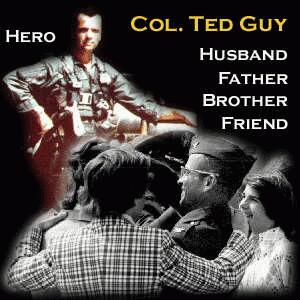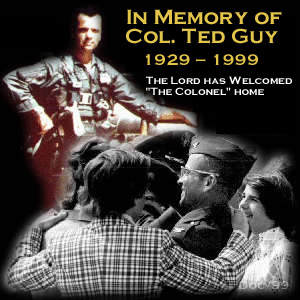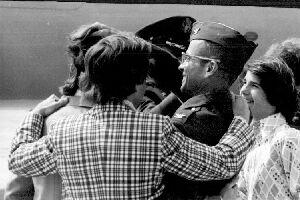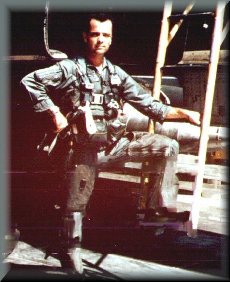Please Note: Ted was laid to rest at Arlington National Cemetery on Friday, 18 June 1999 at 1100 hours. Scroll down for photographic coverage of the services.
From a contemporary press report
Theodore Wilson Guy, 70, of Sunrise Beach, Missouri, died April 23, 1999, at St. Marys Health Center.
He was born April 18, 1929, in Chicago, a son of Theopholus W. and Edwina LaMonte Guy. He was married October 18, 1973, to Linda Bergquist, who survives at the home.
A 1949 graduate of Kemper Military College, he served as a pilot in the Air Force until his retirement in 1973 as a colonel. A veteran of the Korean and Vietnam wars, he received a Silver Star, the Distinguished Service Medal, the Distinguished Flying Cross, the Air Medal and a Purple Heart. He was a POW for five years in Laos and North Vietnam.
After his retirement from the Air Force, he became National Adjutant for the Order of Daedalians.
In 1977, he became associated with TRW, assigned to Iran as Senior Tactical Adviser to the Commander, Iranian Tactical Air Command.
He was a member of St. George Episcopal Church, Camdenton.
Other survivors include: two sons, Ted Guy Jr. and Michael Guy, both of Phoenix; two stepdaughters, Elizabeth Thannum, Los Angeles, and Katherine Roth, Chicago; one brother, Donald Guy, state of Alabama; and three grandsons.
Services will be at 3 p.m. Friday at St. George Episcopal Church. The Rev. Tim Coppinger will officiate. The remains were cremated. Inurnment, with military honors, will be at a later date in Arlington National Cemetery, Arlington, Virginia.
Memorials are suggested to the Leukemia Society of America.
A Tribute to Former Vietnam War POW Ted Guy
by U.S. Senator Bob Smith
April 29, 1999
In the Senate of the United States
TED GUY, AN AMERICAN HERO
MR. SMITH of New Hampshire: Mr. President, I rise today to pay tribute to Retired Colonel Theodore Wilson Guy, United States Air Force, from Missouri. Ted Guy, nicknamed “The Hawk” by those who knew him best, was a genuine American hero. He was best known for having sacrificed his freedom for his country as a U.S. POW during the Vietnam War, but aside from being a hero, he was also a husband, father, brother, and a friend to many, including myself.
Last Friday, April 23, 1999, he passed away only six-months after discovering symptoms associated with Leukemia.
I will always remember Ted Guy for the encouraging faxes and e-mails he used to send to my office, especially during the investigation conducted by the Senate Select Committee on POW/MIA Affairs which I co-chaired in the early 1990s. I gained strength from the inspiring messages of this true American hero.
Ted felt very strongly that our Government needed to do more to account for his missing comrades from the Vietnam War, and he traveled at his own expense to Washington D.C. to the halls of Congress to make his point.
Ted was right to be concerned about our Government’s handling of the POW/MIA issue. And with his support, and the support of his fellow veterans and family members of POWs and MIAs, we’ve made significant progress in opening the books, declassifying records, and pressing foreign governments for answers over the last decade. However, as Ted continued to maintain up until his last days with us, there is still much work to do with our accounting effort, and I, for one, am committed to seeing this issue through, in part, because of people like Ted.
Let me say to the youth of America, if you want role models to aspire to,they just don’t come any betterthan men like Ted Guy.
Ted joined the Air Force in 1947 and served his country as an Air Force fighter jock fort he next 26 years. He served in both the Korean and Vietnam wars, flying the F-84 in the Korean theater of operations, and the F-4 in the Vietnam theater.
On March 22, 1968, while attacking an automatic weapons position near the Vietnamese/Laotian border during the battle of Khe Sanh, Ted’s plane was shot down, and he was captured by communist forces.
Ted was subsequently marched up the Ho Chi Minh trail, and then held in several POW camps in the Hanoi area, to include the infamous Hanoi Hilton. He was brutally tortured by the North Vietnamese, to the point where he would pass out from severe beatings. He was also forced to spend nearly four years in solitary confinement.
When he was finally removed from solitary confinement, he was put in a prison with more than a hundred other U.S. military and civilian prisoners. He became the senior officer mong them and was responsible for maintaining order, chain of command, and the code of conduct among his fellow POWs. His leadership and guidance helped his fellow POWs survive their ordeal. Many of them referred to themselves as “Hawk’s Heroes” in honor of Ted Guy.
To the code of conduct, Ted added his own personal code that consisted of two points. The first point was to resist until unable to resist any longer before doing anything to embarrass his family or country. The second point was to accept death before losing his honor.
Ted once said “honor is something that once you lose it you become like an insect in the jungle. You prey upon others and others prey upon you until there is nothing left. Once you lose your honor, all the gold in the world is useless in your attempt to regain it.”
Mr. President, Ted never, never lost his honor. What an inspiration he was to all Americans.
He leaves behind his wife Linda of 26 years, his four sons and two step daughters. He has touched so many more people, however, with his unselfish and patriotic sacrifices for America and his heartfelt concerns about efforts to account for his missing comrades from the Vietnam War who never made it home. I was proud to call him a friend, and I will miss him.
As with other POWs, Ted used a tap code in Hanoi to communicate through the walls with other POWs. It was an alphabet matrix, five lines across, five lines down. Ted used to end his messages by tapping the code GBU for “God bless you,” and CUL for “see you later.” Today, I’d like to end my tribute with the same message to Ted, “GBU, CUL.”
Mr. President, I ask unanimous consent that tributes to Ted Guy from his son, his POW/MIA supporters, and his dear friend and fellow POW, Swede Larson, be entered in the record immediately following my remarks, along with the obituary carried in his local paper.
Thank you, Mr. President.
“I am a retired Air Force fighter jock, with over two hundred and fifty combat missions, both in Korea and Vietnam. On March 22, 1968, while on a mission in Southern Laos, I was zapped by the North Vietnamese Communists and became their guest in the various resorts in Laos and in and around Hanoi, North Vietnam.
Apparently, I complained too much about the service, or lack thereof, and spent almost four of the next five years in solitary confinement. During this time, I had the honor of being the commander (Senior Ranking Officer) of those captured in South Vietnam, Cambodia, and Laos. In our group we had State Department employees, members of all service branches, and even two West German nurses, one of which was a lovely young lady named Monika. You must admit, this was a very unusual and diverse group, but it was the finest command I ever had the honor of commanding in my 26 years of service. We were known as ‘Hawk’s Heros.'”
Colonel Ted Guy, who I had the pleasure of communicating with on the Internet, died peacefully on April 23, 1999 from complications of a leukemia-like disease. He will soon come to Arlington National Cemetery to rest among the other American heroes there.


Ted W. Guy, a retired U.S. Air Force colonel was the commander of all troops, civilian and military, captured in South Vietnam and Laos during the Vietnam War. The troops he commanded were interned in North Vietnam. The following text is adapted from an article he wrote for the San Antonio, Texas Express News, November 10, 1991.
What price must a man pay for glory? What price must a man pay for freedom? I suggest to you, and firmly believe, that many have already paid the price.
I refer to those a country abandons after the cessation of hostilities. In the case of glory, I feel that multitudes have paid the ultimate price and have either died or given up because our nation made the decision – for whatever the reason – and abandoned those who fought so bravely.
In the case of freedom, I contend that dozens are still fighting and still believe that one day they will be free.
No, I do not have any firm evidence that men are still alive – soldiers who once served their country with pride and were abandoned after the war ended. But I do have an unwavering belief and I would like to tell you why I believe as I do.
Vietnam was my second conflict. Like Korea, I volunteered many times before I received a fighter assignment to serve. The reason I wanted to serve in the Vietnam conflict was identical to the one for the Korean War.
I firmly believed, and continue to believe to this day, that as long as there are people in this world who want to be free and are willing to fight and die for their freedom, that the United States of America has a moral obligation to help that nation and people gain their freedom, even at the cost of American lives in far-off lands.
On March 22, 1968, while attacking an automatic weapons position over-looking Route 9 in Southern Laos near Tche-pone, my F-4c sustained heavy damage and I went down.
After engaging in a firefight with 15 North Vietnamese regular army troops, I was captured. Although wounded, I was dragged and hauled for approximately three hours to an enemy camp that contained a large number of wounded Vietnamese army soldiers.
The point that I want to make is that I was captured by North Vietnamese, not Pathet Lao. All 10 of us captured in Laos and later released were also captured by Vietnamese.
That evening, at approximately 7:30 seven of the original group that I engaged earlier in the day entered the underground hooch where I was being held. What happened next cannot be called an interrogation, because none of us spoke the same language.
After several hours of beating and treatment beyond my wildest beliefs, I passed out.
Early the next morning, I regained consciousness and thought about the previous 24 hours and what the enemy had done to me. I thought about the Code of Conduct and carefully reviewed every article of that masterful document. Even though I fully intended to abide by the code, I felt that I personally needed something stronger than the code if I were to survive.
I made a personal code that consisted of two points and would be my amendment to the Code of Conduct. The first point was:
I would resist until I was unable to resist any longer before I would do anything that would embarrass my family or my country.
The second point:
I would accept death before I would lose my honor.
These may sound like so many words to you, but I assure you that they meant a great deal to me. But just what do these words mean?
After the abuse I endured, I knew that they could probably break me. In fact, if anyone had spoken the English language they probably would have gotten quite a bit out of me the night before. I knew that I must maintain control of my faculties and appear to give in before I lost complete command of what I might say or do.
The second point regarding honor is very important to me, and I feel that it should be very important to all of us.
Honor is something that once you lose it you become like an insect in the jungle. You prey upon others and others prey upon you until there is nothing left. Once you lose your honor, all the gold in the world is useless in your attempt to regain it.
Firm belief
The reason I tell you this is quite simple.
I feel that others may have made a similar code, and because of it they are alive in the jungles of Laos today. There is little doubt in my mind that by living up to this code or a similar code, I could have survived years of imprisonment.
After my release in March 1973, and until November 1989, I fully supported the position of the U.S. government that all prisoners of war were home and that those missing in action were all dead.
When questioned during speeches to countless thousands of people and the families of MIAs on my beliefs, my answers were easy: “The U.S government has done everything possible to determine the fate of those missing.” And, “What is your proof that anyone was left behind?”
This was the easy way out. I will not go into the reasons why I changed my mind, but I believe they are significant.
I now believe we did leave men behind and that some are still alive and being held against their will in Southeast Asia and are controlled by the government in Hanoi.
My beliefs were further strengthened on September 24, 1991 when a small group of people who share my beliefs met with Ken Quinn, deputy assistant secretary of State for East Asian and Pacific Affairs, and Carl Ford, deputy assistant secretary of Defense for East Asian Affairs.
In all fairness to Quinn, we were treated with respect and he serious sought our recommendations. On the other hand, Ford convinced me that he considered us a nuisance and that his approach was the only correct one to solve this dilemma. I came away from a second meeting with nothing but sympathy for the POW/MIA families and the rest of the people who feel as I do about this issue.
I feel that the POW/MIA nightmare, an issue that supposedly has the highest national priority, continues to be a parody. The so-called “footprint” involving the Cambodia situation is, in my opinion, seriously flawed. It will not get our men home, regardless of the reason for which they stayed behind or were left behind.
The Vietnamese are not stupid. I can attest to that, and they will milk us for everything they can in an effort to placate our curiosity. Bones and information will suddenly appear and will be traded for commerce and recognition.
In my judgment, and I am certain it is shared by many, we must squeeze the Vietnamese into a corner until the living POWs in Laos and elsewhere are freed. There can be no lifting of trade embargoes, no international loans and no normalization until the living POW issue is solved to the satisfaction of the POW/MIA families and the American people.
During a July 11, 1991 press conference at the National Press Club, I stated before CBS and CNN camera crews that I believed there was a massive cover-up with the U. S. government concerning the POW/MIA controversy.
Although I feel that the Vietnamese government holds the key to the solution, blame for why the problem was allowed to happen and continue to this day, rests solely with the U. S. government.
During the deliberations to get to the bottom on the POW/MIA question, I’m sure there will be many embarrassments and some heads may fall.
The United States will recover and become a better nation because we, the people, solved and corrected a serious injustice.
FINAL COMMENT
Let me conclude with one final comment: “A majority of Americans believe that soldiers were left behind in Southeast Asia after the Vietnam War.”
Two months ago I spoke to senior Air Force ROTC students at Lackland, AFB. After I was introduced, I asked the following question: “How many of you feel that we left men behind after the war in Vietnam?” The answers were spontaneous and difficult to judge.
I then rephrased the question and asked, “How many of you feel that all who served in the Vietnam conflict were fully accounted for after the cessation of hostilities in 1973?’ Out of 151 cadets in the class, only four raised their hands!
Senate Resolution 82 was passed on August 2, 1991. It’s term is one year.
I ask a very simple question. How much longer will it take to answer the many questions surrounding the POW/MIA issue and get our boys home where they belong?
Michael Robert Patterson was born in Arlington and is the son of a former officer of the US Army. So it was no wonder that sooner or later his interests drew him to American history and especially to American military history. Many of his articles can be found on renowned portals like the New York Times, Washingtonpost or Wikipedia.
Reviewed by: Michael Howard


